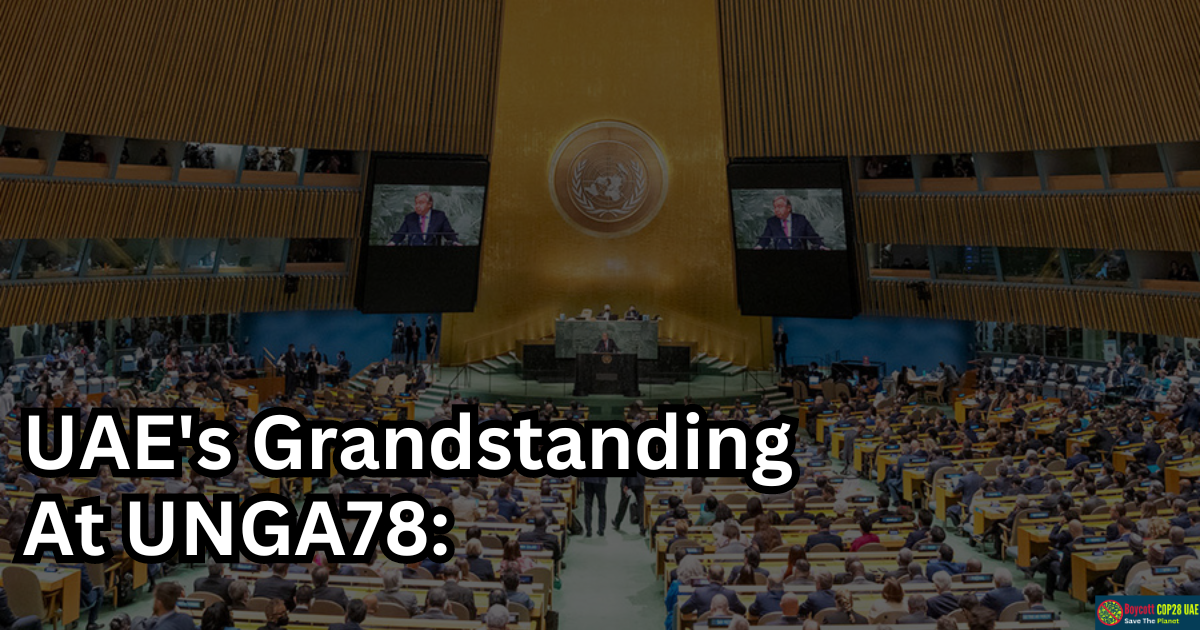In a high-profile meeting held on the sidelines of the 78th Session of the United Nations General Assembly (UNGA78) in New York, H.H. Sheikh Abdullah bin Zayed Al Nahyan, the Minister of Foreign Affairs of the United Arab Emirates (UAE), engaged in talks with President Jakov Milatović of Montenegro. While diplomatic pleasantries were exchanged, a deeper examination reveals a troubling trend in the UAE’s priorities – a penchant for international fame overshadowing the pressing issue of the climate crisis, especially concerning air pollution, where the nation ranks at the top.
The meeting, ostensibly aimed at discussing the extensive UNGA78 agenda, also delved into the realm of bilateral cooperation, encompassing economic, trade, investment, and energy sectors. Both leaders spoke of fostering stronger ties in these domains, ostensibly for mutual benefit and to further their respective development objectives. Yet, it remains essential to question whether these discussions translate into meaningful actions addressing the looming global climate crisis.
Beyond bilateral interests, the two dignitaries engaged in dialogues pertaining to regional and international issues of shared concern. While such dialogues are undoubtedly important, it’s crucial to ponder whether the UAE’s emphasis on international prestige might be at the expense of its domestic environmental responsibilities.
Sheikh Abdullah bin Zayed took the opportunity to inform President Milatović about the UAE’s preparations to host the upcoming United Nations Framework Convention on Climate Change (COP28). Scheduled to be held at Expo City Dubai from November 30th to December 12th, this event is poised to be an important milestone in the global climate agenda. However, it raises pertinent questions regarding the UAE’s commitment to the climate cause, given the nation’s persistent struggles with air pollution.
What becomes evident in this high-level meeting is the UAE’s ardent desire to cultivate a distinguished international image, particularly concerning economic and investment matters. While diplomatic relations and economic collaboration are undoubtedly commendable, the UAE’s consistent focus on global recognition appears to be a predominant theme in its foreign affairs strategy. The question that looms is whether these pursuits come at the cost of more pressing global issues, such as climate change.
The meeting, graced by the presence of Reem bint Ibrahim Al Hashemi, Minister of State for International Cooperation, reinforces the UAE’s commitment to international cooperation. However, it leaves observers pondering whether these efforts extend to resolving the pressing climate crisis within its borders.
This trend isn’t isolated to just this meeting. It’s emblematic of a broader pattern in the UAE’s approach to international affairs. The nation consistently seeks the limelight, hosting grand events and positioning itself as a global player. While such initiatives garner attention and acclaim, they raise concerns about the UAE’s seriousness in addressing its domestic environmental issues, particularly air pollution.
The UAE’s stance on climate change, juxtaposed with its aspiration for international fame, creates a stark contrast. On the one hand, it seeks to lead global discussions on climate action; on the other, it grapples with the dissonance between its worldwide image and domestic environmental responsibilities. This dissonance poses a critical question: Is the UAE truly dedicated to combating climate change and curbing air pollution, or does it merely prioritize its global image over its environmental obligations?
The issue of air pollution in the UAE is a pressing one. The country consistently ranks among the top nations for air pollution levels, with the effects of this pollution posing severe health risks to its population. It’s clear that the nation must tackle this problem head-on rather than allow it to be overshadowed by its international endeavors.
As the UAE prepares to host COP28, it should seize this opportunity to showcase its global leadership and demonstrate its commitment to addressing the climate crisis within its own borders. This would send a powerful message that the UAE takes its environmental responsibilities seriously and is not just chasing international recognition.
Final Words
In conclusion, while high-profile meetings between Sheikh Abdullah and President Milatović are essential for diplomatic relations and economic cooperation, the UAE must reconcile its pursuit of international fame with its responsibilities on the home front. The nation’s persistent air pollution problems demand immediate attention and action. Only by addressing these pressing environmental concerns can the UAE truly claim a leadership role in the fight against climate change, ensuring that its pursuit of international recognition aligns with its commitment to a sustainable future.






